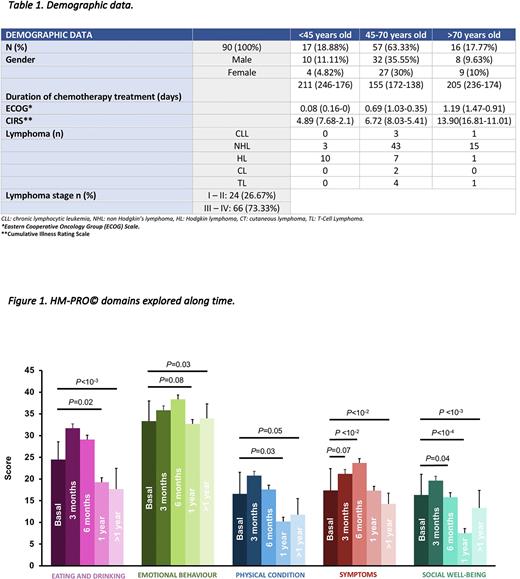Abstract
INTRODUCTION: Electronic collection of patient-reported outcomes (PROM) is becoming widespread in healthcare to objectively measure and collect the patient's subjective experience during their illness. The implementation in routine cancer care during treatment remains to be seen. More specifically, little is known about the use and success of electronic reporting during active cancer treatment in frail and older patients. HM-PRO© is a validated PROM tool developed by the European Hematology Association Specialized Working Group of QoL in patients with hematologic malignancies.
OBJECTIVES: The primary end point was to analyze the adverse effects reported by patients when receiving intravenous chemotherapy treatment and its impact on the quality of life of patients over time through the HM-PRO© questionnaire.
METHODS: Of the 200 patients included in the health outcomes assessment program, 90 patients with a diagnosis of lymphoma and with at least two completed questionnaires were collected during the period 2020-2022. The scores and answers to the HM-PRO© questionnaires were also gathered. HM-PRO© questionnaires were submitted electronically through the hospital patient portal prior to the start of treatment and subsequently at 3, 6, 12 months and 1 year after starting chemotherapy. The questionnaires included questions about eating habits, social life, mental health and personal emotional situation, physical condition and symptoms derived from the lymphoma itself and/or chemotherapy. The statistical analysis was performed using a generalized model with patient analysis of the time variable including the necessary confounding variables for each quality variable. Temporal autocorrelation with the AR1 function has been considered.
RESULTS: Demographic data are shown in Table 1. Age at diagnosis did not influence any parameter except for physical status where we found significant differences (p=0.002, rho=0.1095), probably in relation to greater frailty in older patients. However, the side effects of treatment, and the symptoms associated with the disease were tolerated similarly regardless of age. In terms of gender differences, men were less affected in their eating & drinking habits. Men show a tendency to remain with less symptomatic burden during treatment. The involvements of the social and emotional spheres were similar in both sexes Symptoms related to the disease or treatment improved after 6 months (p<0.02) from the onset of chemotherapy. Physical condition improved significantly after one year (p=0.03) regardless of the lymphoma' stage and the comorbidities. The nutritional status of patients also improved after 12 months and was influenced by the stage of lymphoma, with better scores among patients with localized disease (p=0.02). At the social level, patients experienced a significant improvement after 6 months, especially those with localized stages and a lower score on the CIRS (Cumulative Illness Rating Scale) scale. This does not occur in the emotional sphere where it takes more than 12 months to observe a significant improvement (p=0.03). This was probably because mental health and psychological sequelae were more complex to deal with in the short term (Figure 1).
CONCLUSIONS: Intravenous chemotherapy is not free of adverse events and may affect patients in very different ways; it is important to compile these side effects in order to help healthcare workers to provide a more individualized care. Older patients suffer a greater deterioration of their physical condition but their other spheres are no more affected than in the rest of the population. Geriatric assessment is fundamental and age alone should not be the only limiting factor in treating our patients. If we take into account the stage of the lymphoma, it significantly affects the social aspect and the eating habits of the patients. On the other hand, a higher score on the CIRS scale only correlates with a worse score on the social well-being. This indicates that a comprehensive approach to all spheres of the patient's life must turn now into a reality. The self-perception of symptoms due to lymphoma as well as the chemotherapy-related toxicity impact negatively in the quality of life of patients in a relevant way during the first year after diagnosis, improving significantly afterwards to their baseline situation. Intensive treatment does not indefinitely affect the quality of life of hematologic patients.
Disclosures
Cordoba:Janssen: Consultancy, Honoraria, Speakers Bureau; Incyte: Consultancy; GenMab: Consultancy; Takeda: Consultancy; Kite: Consultancy, Speakers Bureau; Pfizer: Research Funding; Bristol Myers Squibb: Consultancy, Honoraria; Celgene: Honoraria; Gilead: Honoraria; Lilly: Consultancy; BeiGene: Consultancy; AstraZeneca: Consultancy, Honoraria, Speakers Bureau; AbbVie: Consultancy, Honoraria, Speakers Bureau; Roche: Consultancy, Honoraria, Speakers Bureau.
Author notes
Asterisk with author names denotes non-ASH members.


